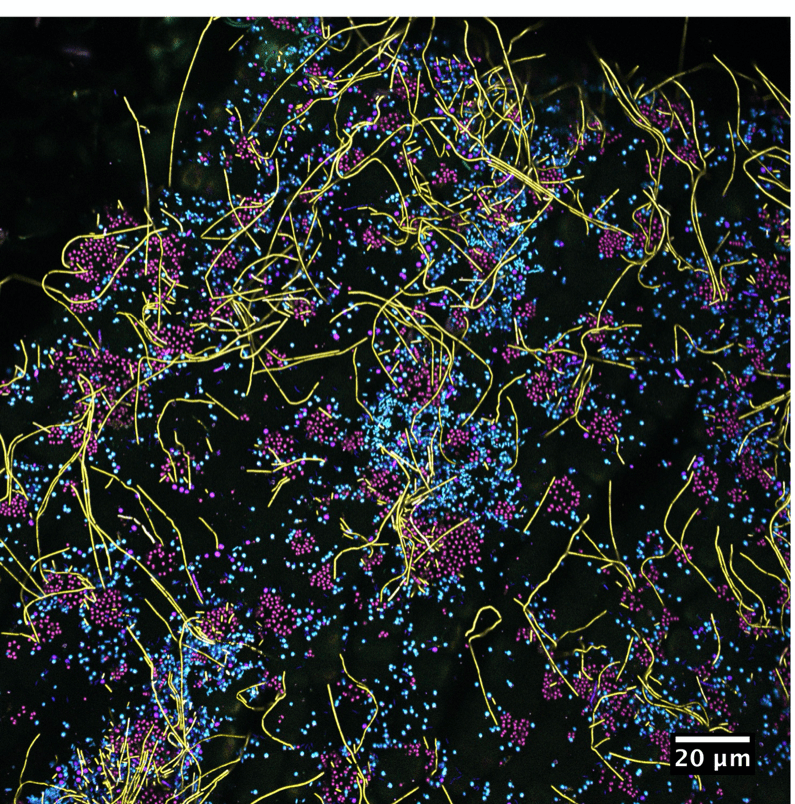
Thanks to Sandi Doughton and Steve Ringman at the Seattle Times for highlighting the great research that is occurring in Washington state to study declining kelp populations. Restoration efforts with Nereocystis, the bull kelp, are featured. This was a unique collaboration among many entities and stakeholders. Read the article.

Ramirez-Puebla, ST, Weigel BL, Jack L, Schlundt C, Pfister CA, Mark Welch JL. 2022. Spatial organization of the kelp microbiome at micron scales. Microbiome.10(52) https://doi.org/10.1186/s40168-022-01235-w

Josie Iselin and Marianna Leuschel have made an informative web resource about bull kelp in the Northeast Pacific Ocean. Click through and discover the different processes and threats to kelp forests.
Read Matt Wood’s article and see the video about our research on Pacific Northwest kelp forests and change over decades and centuries, featuring a rare folio from the Mansueto library: https://www.uchicagomedicine.org/biological-sciences-articles/world-war-i-era-maps-help-track-history-of-kelp-forests-in-pacific-northwest

Read the WNDR story map about kelp: https://washingtondnr.wordpress.com/2018/01/10/washingtons-kelp-forests-rely-on-cool-weather-and-water-to-thrive/
Dec 2016: Look for Pfister & Wootton lab data on downward trends in ocean pH and mussel shell thickness at Tatoosh Island. In the issue on US National Parks in the National Geographic Magazine, p. 117. Here
Sept 2014 New York Times article on Sophie McCoy’s Tatoosh Island coralline algae
http://www.nytimes.com/interactive/2014/09/22/science/on-the-cusp-of-climate-change.html?ref=science
2012 New York Times article on Tatoosh Island studies
http://www.nytimes.com/2012/10/07/us/scientists-in-washington-state-adopt-tiny-island-as-climate-change-bellwether.html?_r=0
Videos about the research in our lab
A show on Ocean Acidification produced by Oregon Public Broadcasting
http://www.opb.org/programs/ofg/segments/view/1742
A video on ocean acidification on Tatoosh produced by the University of Chicago
http://news.uchicago.edu/multimedia/survival-and-diversity-tatoosh-island
Kelp Forests and change over decades and centuries in the Pacific Northwest
Matt Wood has been writing about our research through the Science Life blog at the U of Chicago:
Mark Bitter’s findings about genetic variation in mussel adaptation to ocean acidification
Kelp Forests and change over decades and centuries in the Pacific Northwest https://www.uchicagomedicine.org/biological-sciences-articles/world-war-i-era-maps-help-track-history-of-kelp-forests-in-pacific-northwest
Modern mussels are thinner now compared with those in Native American middens (with a salute to Robert Paine):
https://sciencelife.uchospitals.edu/2016/06/15/modern-mussel-shells-much-thinner-than-50-years-ago/
Read about using mussels shells to interpret ocean history
http://sciencelife.uchospitals.edu/2011/11/02/a-story-of-climate-change-told-through-seashells/
Read about our latest finding on pH declines in Washington state
http://sciencelife.uchospitals.edu/2013/02/06/the-list-of-explanations-for-ocean-acidification-keeps-getting-smaller/
The fate of nitrogen in the ocean is an area of research common to the Marine Biological Lab and our lab. Our 2014 Coastal Nitrogen Synthesis Charette at the MBL resulted in this paper about coastal animals, their microbiomes and nitrogen processing:
____________________________________________________________________
Collaborative work with Sophie McCoy at the University of North Carolina about the changes to species that have calcium carbonate
Sophie McCoy demonstrates a changed fate for a formerly competitively dominant species of algae:
http://sciencelife.uchospitals.edu/2014/01/16/rock-paper-scissors-algae/
http://phys.org/news/2014-01-key-species-algae-effects-climate.html
http://news.medill.northwestern.edu/chicago/news.aspx?id=226675
Mineralogy of mussel shells:
How Mussels Cope with Ocean Acidification Sheds Light on Effects of Climate Change

The UChicago undergraduate publication Scientia
Thanks to Indira Khera (above) for a fun interview with Scientia, a publication by the Triple Helix student organization at UChicago

